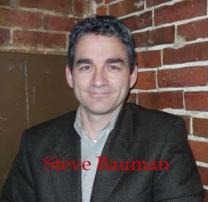|
|
 |
|
|
Aloha!
Steve Bauman
EARLYJAS Rag January 2005
|
|
|
|
|
|
|
musicians in the area, is getting out of music. Steve’s last gig was with the Gene Fioca band New Year’s Eve at
the Sheraton Suites in Cuyahoga Falls. That last gig was with a really swinging band – Steve tripling on
trumpet, tenor sax, and vocal. Those who were there say that it was a bittersweet evening. Steve played so
well and captured the crowd but only a few people knew that it was an Aloha evening for Steve. More on
Aloha later.
Steve has had a remarkable career as a traditional jazz musician. He took piano lessons and trumpet lessons as
a kid. His dad was a trombone player and jazz record collector. Early on, Steve discovered an Audio Fidelity
LP: Louie and the Dukes of Dixieland. He wore out the vinyl and soon knew all the tunes. In 9th grade,
living in Boulder, Colorado, Steve wanted to join the fledgling new high school Dixie band called the Pearl
Street Jazz Band (PSJB). Steve started with the PCJB on tuba but quickly became the trumpet player. The band
matured and got many gigs in and around Denver, including a long stint at Heritage Square Opera House in
Golden, CO. They played authentic arrangements that they learned from listening to old records. One of my
favorite s on the three LPs they recorded is Snakes Hips – not a song heard often. Given the proximity of the
world famous Queen City Jazz Band, the young Pearl City kids were greatly influenced by the QCJB and
followed them around, even playing off nights for them.
While in college, a mentor, Dr. Bill Clark, pulled Steve into a band that won a national collegiate Dixieland
band competition and led to tours throughout the West, the Kentucky Derby, and lots of local TV shows.
They also appeared on the Today Show and the Merv Griffin show.
Steve was fluent in Spanish and went to study in Costa Rica for a year. The year was cut short when the
Queen City Jazz Band called him to join the band. The QCJB played tricky music, stylish arrangements, rare
tunes, and were crowd pleasers. The band toured extensively and made numerous recordings. It was a great
musical education. Steve owes some of his style to his predecessor, Wes Mix, who had studied with Al Hirt.
Steve uses some of Wes’ technical skills and fast fingering techniques. He quickly names Louie Armstrong as a
prime influence. Steve also played two stints with Your Father’s Mustache Band. That band along with the
QCJB helped Steve acquire a knack for the ‘Show Biz’ part of the music.
Along about this time, Steve met Cindy, who became his bride. They did something very smart. Instead of
plunging immediately into the workaday world they took half a year to tour all over Europe. Steve took his
trumpet and sat in with bands in a variety of places in Europe.
Around 1990, the Baumans moved to the Washington DC where Steve quickly became a part of that jazz scene,
playing with many of the local bands in venues ranging from the jazz clubs in Georgetown to the National
Mall. It was in DC that Steve started playing the tenor saxophone. Why? He simply was interested and
wanted another instrument. That decision added another layer of complexity and style that has served him
well in recent years.
In 1994, the Baumans moved to Munroe Falls, OH, and soon Steve heard about EARLYJAS and attended a few
meetings. It wasn’t long before he was a regular sub for bands such as the Earlville band. Dick Jacoby
discovered him and Steve soon became a ‘main man’ for Dick’s Red Garter JB and Trio. He was a regular at
Benito’s for several years and produced a CD of that band. He has enjoyed working with George Foley for
several years as well as with Billy Kaye. A couple of years ago, Steve gathered a few NE Ohio musicians and
started the Classic JB; a CD of his work with them is still available.
In 2003, Steve got a call from some of his old band mates in Colorado who invited him to tour Moscow with
them. Among other places thay played at the Tchaikovsky School of Music. There they played ‘Midnight in
Moscow’ and were astonished to hear hundreds of people singing along in Russian.
Steve has decided that he needs to put his family ahead of his music. He wants to spend more time with
Cindy and with daughter Emily (age 12), and son Jack, (age 7). He is in mid-career in his demanding day job.
Practicing an hour a day on trumpet and sax takes a chunk of time – time that might better be spent driving
Jack to this or watching Emily do that.
Now about that Aloha… Steve spent a few tender years living in Hawaii. In Hawaii, Aloha means a lot of
things. Here’s a Google dictionary definition: “(Aloha) can mean hello and goodbye, welcome or farewell,
celebration, and best wishes.” It can mean: “I’ll be back.” Steve has said that performing has been a big part
of his life and that some day he will return. He is taking a hiatus or sabbatical, not a retirement.
From Steve’s many fans, we wish you Aloha and hope that your departure from the jazz scene is temporary.
All the best to you, Steve, Cindy, Emily, and Jack.
|
|
|
|
|
|

